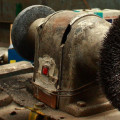Custom libraries in Opencart (v2)
Creating custom libraries in Opencart can be very helpful. Creating additional functionality with a library is easy. In this article is shown how to create a custom library and how to use it, including autoloading, if that is preferred.
Some assumptions before we start
I assume that you know what a library is (in fact a class with some methods, we call a library) and that it has to be placed in the folder 'system/library' of your Opencart installation.
The name for our library in this example will be 'Megatron' (just to make it obvious). So we will have a class defined in a file named 'megatron.php' in folder 'system/library'. The name of the class is 'Megatron'.
How conventionally a library is loaded
Before you can use a library, you have to load it first. We do this usually in a controller with:
$this->load->library('megatron');This looks very spectacular, but is not much more than that Opencart will look for a 'php' named 'megatron' in the folder 'system/library'.
From there on it would be working like this in daily practice:
$this->load->library('megatron');
// megatron is a singleton !!!
$megatron = Megatron::get_instance($this->registry);
$firing_mode_current = $megatron->getCurrentFiringMode();
$firing_modes_available = $megatron->getAllFiringModes();
return [
'current' => $firing_mode_current,
'available' => $firing_modes_available
];As you can see is the library first loaded, then with get_instance the object (singleton) is assigned to variable $megatron.
Let's assume that our Megatron is required all over the place (our Opencart that is), then it would be usefull to autoload (not autobod) the library (instantiate) when starting Opencart.
Autoloading a custom library
Autoloading requires a bit more work, but is not that difficult either to achieve.
After we created our library, we need to register it. In our situation we will do this with a modification, that we will install with menu option:
Extension -> Extension installer
The customization file looks like this:
megatron.ocmod.xml
<?xml version="1.0" encoding="utf-8"?>
<modification>
<code>RegisterMegatronLib</code>
<name>Register Megatron Library</name>
<version>1.0</version>
<author>Megatron</author>
<link>http://www.megatron.author</link>
<file path="catalog/controller/startup/startup.php">
<operation>
<search>
<![CDATA[
$this->registry->set('openbay', new Openbay($this->registry));
]]>
</search>
<add position="after">
<![CDATA[
$this->registry->set('megatron', new Megatron($this->registry));
]]>
</add>
</operation>
</file>
</modification>What is modified
-
File to be modified: catalog/controller/startup/startup.php.
-
What position is modified: (just after)
$this->registry->set('openbay', new Openbay($this->registry)); -
What is inserted:
$this->registry->set('dbimg', new OurCustomLib($this->registry));
How to use an autoloaded library
Let's assume this OurCustomLib has a method named getTheHotJuice, then it works as following:
$firing_mode_current = $this->megatron->getCurrentFiringMode();
$firing_modes_available = $this->megatron->getAllFiringModes();
return [
'current' => $firing_mode_current,
'available' => $firing_modes_available
];Well, there it is, the megatron library is now registered and therefor like any other autoloaded library within Opencart accessible through:
$this->megatron







